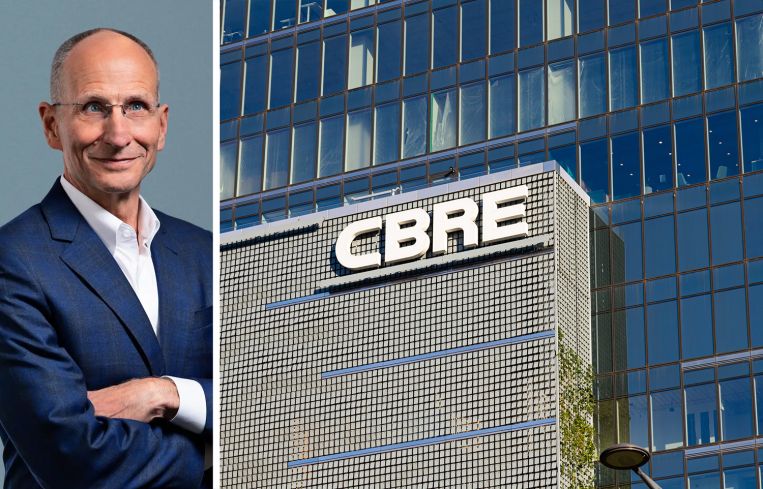CBRE Reports Record Earnings With Q4 Revenues of $10B, Cash Flow Up 60%
The global CRE brokerage and investment management firm is seeing the money come in as office leasing rebounds in the U.S.
By Brian Pascus February 13, 2025 12:32 pm
reprints
CBRE ended 2024 on a positive note, setting records across nearly every cash flow metric. The company’s leadership highlighted recent M&A activity and stronger office leasing as the fuel that drove performance.
CBRE reported improved financials across all metrics during its fourth-quarter earnings call Thursday, as revenue rose 16 percent quarter-over-quarter to $10 billion, with full-year increases of 14 percent to $35.7 billion. Cash flow increased by nearly 60 percent in the fourth quarter to $1.3 billion, with full-year cash flow from net operations coming out to $1.7 billion in 2024, up from the $480 million the firm reported in 2023.
The firm posted core earnings per share increases of 67 percent, rising from $1.38 in the fourth quarter of 2023 to $2.32 in the fourth quarter of 2024, and saw core earnings before interest, taxes, depreciation and amortization rise by a whopping 47 percent.
CBRE CEO Bob Sulentic said the firm’s performance in the fourth quarter of 2024 set a new standard in terms of revenue generation and cash flow.
“Fourth quarter of 2024 was CBRE’s best quarter ever for core earnings and free cash flow, with broad strength across our business,” he said. “We also made significant progress in executing our strategy, positioning the company to continue to deliver double-digit earnings growth on an enduring basis.”
Sulentic highlighted CBRE’s $400 million acquisition of Industrious, a global shared workspace company, in January 2025, along with the firm’s $800 million worth of share repurchases in the third quarter of 2024.
He noted that these moves indicate an aggressive outlook CBRE plans to take in 2025, notably various consolidations that will allow the firm “to build expertise and scale advantage across many areas that are common to the operation of buildings.”
He also added that CBRE’s acquisition strategy — which includes its growing majority ownership of subsidiary Turner & Townsend — has not yet been accurately reflected in the firm’s stock price, despite its recent increases.
The stock sits at $140.12 per share on Feb. 13, 2025, compared to $85.14 on Feb. 13, 2024.
“Our confidence in CBRE’s future has never been higher, as evidenced by our considerable share repurchases since the end of the third quarter,” said Sulentic. “Despite the strong appreciation of our shares in the last year, we believe the market is undervaluing our business relative to both its growth profile and its dramatically enhanced resiliency.”
CBRE Chief Financial Officer Emma Giamartino said the firm “exceeded expectations, with a record quarter across almost every metric.”
The firm’s global workplace solutions business, which includes facilities management and project management across asset classes and industries, saw its revenues rise from $2.3 billion in the fourth quarter of 2023 to $2.8 million in the fourth quarter of 2024.
CBRE’s advisory services (i.e. brokerage) revenues rose from $2.5 billion in the fourth quarter of 2023 to $3 billion in the fourth quarter of 2024, largely on the heels of strong U.S. office leasing revenues, which grew by 28 percent, and improved property sales revenues, which increased by 35 percent.
But both Giamartino and Sulentic took time to highlight the rebounding office market.
“Office occupiers are increasingly comfortable about making long-term decisions given improved return-to-office momentum and a healthy economic outlook,” said Giamartino. “The durability of office leasing growth was a prominent question as recently as October, when we last reported earnings.”
She added that gateway markets such as New York, San Francisco, Los Angeles, Washington, D.C., Boston and Chicago saw their office leasing grow by 30 percent in aggregate, and that larger markets like Dallas, Atlanta and Seattle grew even faster, which has given CBRE confidence “that office leasing will continue to increase as activity has spread broadly.”
Sulentic said that office leasing has moved beyond New York City and can no longer be considered just “a Park Avenue phenomenon,” due to the big fees associated with leases in New York. He added that post-COVID office leasing is “returning to the mean,” with metrics getting closer to the 2019 baseline than experts had originally anticipated.
“I would argue there was a pretty profound shift of what was going on in office leasing toward the back half of last year,” he said. “What we saw [in Q3 and Q4] was pretty strong growth in all the gateway markets. … We saw something different happen, we spent a lot of time with our clients, and what they said was their view on use of office space has stabilized.”
Brian Pascus can be reached at bpascus@commercialobserver.com



